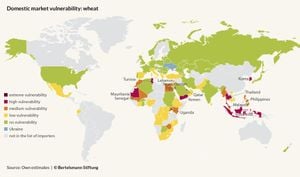National Depression Awareness Day is observed annually on February 23, and this year it highlights the urgent need for public awareness about depression, as well as urging individuals suffering from this serious mental health condition to seek treatment.
According to recent statistics, over 1.5 million people in Poland are grappling with depression, which is commonly misunderstood as mere sadness or melancholy. Depression is characterized by persistent sadness, lack of energy, and various physical symptoms, and it constitutes both a significant health and social issue. The fact remains, depression is much more than just feeling down; it is often accompanied by feelings of hopelessness and despair, leading to severe consequences if left untreated.
The aim of National Depression Awareness Day is to educate the public about the signs of depression, urging those who are suffering to seek medical help. This was reinforced by Professor Natalia Pawlas from the St. Barbara Hospital, who emphasized, “Depression is a serious illness which can lead to death.”
Statistics around mental health continue to alarm health experts. Reports indicate over 5,000 suicides occur annually, with men constituting approximately 80 percent of these cases. Much of the stigma surrounding mental health issues stems from societal expectations, especially among men, who often feel pressure to appear strong and emotionless. This cultural issue can prevent individuals from seeking help when they need it the most. Mateusz Kawka, psychiatrist, stated on the podcast “PodRóż do męskości”, “The lifestyle we lead encourages the emergence of mental health disorders. We live faster, everything must be at 100 percent, and the boundaries between personal and professional life have blurred.”
Despite the alarming statistics, there is hope. Awareness days like this increase discussions about depression, and more individuals and public figures are coming forward to share their stories. Artists like Kazik Staszewski and actors such as Olaf Lubaszenko have spoken openly about their battles with the illness. Kazik, for example, revealed, “I have had several years of overall discouragement and low mood, which is all tied to depression.” His experience emphasizes the difficulties faced by many who struggle silently.
To address the mental health crisis, facilities offering psychological support have been established across Poland. For example, the Podlaskie Voivodeship has seven Mental Health Centers where assistance is available through the National Health Fund (NFZ). Notable institutions include the University Clinical Hospital and the Podlaskie Psychogeriatric Center, both located in Białystok. These facilities provide immediate support without the need for referrals and lengthy wait times.
While there has been some progress, the healthcare system for mental health remains under strain, as evidenced by the waiting times to see psychiatrists, with reports indicating up to year-long waits. This raises concerns about accessibility to timely help, especially as the need for mental health services continues to escalate. Countries like Germany and Finland boast significantly more psychiatrists per capita, which points to the gaps still present within Poland's mental health framework.
The World Health Organization (WHO) estimates roughly 350 million people worldwide are affected by depression, which is projected to become the most commonly diagnosed mental disorder by 2030. The need for comprehensive treatment is echoed by health professionals who advocate for prompt intervention. The first step for anyone facing mental health challenges is to consult with a psychiatrist, followed by seeking therapy for effective management and recovery.
Numerous community initiatives, telephone hotlines, and outreach programs aim to bridge the gap for those not receiving care. For example, various crisis helplines provide support, including the free emotional crisis helpline available 24/7, ensuring help is attainable for those needing immediate assistance. Recognition of this issue across Poland is increasingly urgent, with campaigns to destigmatize mental health issues being key to providing the necessary support to those at risk.
The annual observance also encourages the community to break down the stigmas surrounding depression and mental health. By doing so, it promotes environments where open conversations about feelings and mental well-being can flourish. The more society acknowledges and addresses mental health, the easier it may be for those who are struggling to find solace and support.
Although challenges remain, the growing awareness initiated by National Depression Awareness Day offers hope and light to individuals dealing with mental health issues. Fellow citizens are urged to listen, engage, and take part fully in these conversations, as it may save lives. By remembering to promote kindness and empathy, society can work together to create supportive networks for those suffering silently.
Efforts to address depression and mental health issues will continue to evolve, with each awareness day bringing new insights, recommendations, and resources to improve the lives of millions. To learn more about mental health resources available or to seek help, individuals can reach out to local mental health centers and take the first step toward healing.



